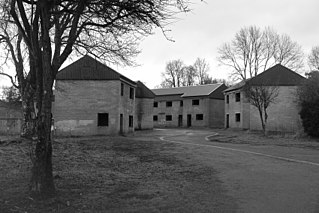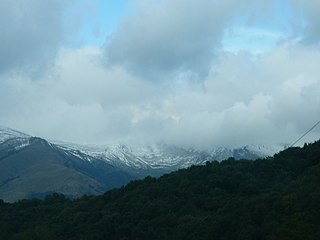Imber is a depopulated village in Wiltshire, England.
Imber may also refer to:
- Imber (surname)
- IMBER, an international project on ocean biogeochemical cycles and ecosystems
- Imber tropicus , a moth of the family Sphingidae
Imber is a depopulated village in Wiltshire, England.
Imber may also refer to:

Hatikvah is the national anthem of the State of Israel. Part of 19th-century Jewish poetry, the theme of the Romantic composition reflects the 2,000-year-old desire of the Jewish people to return to the Land of Israel in order to reclaim it as a free and sovereign nation-state. The piece's lyrics are adapted from a work by Naftali Herz Imber, a Jewish poet from Złoczów, Austrian Galicia. Imber wrote the first version of the poem in 1877, when he was hosted by a Jewish scholar in Iași.

Eyalets, also known as beylerbeyliks or pashaliks, were the primary administrative divisions of the Ottoman Empire.

Naftali Herz Imber was a Jewish Hebrew-language poet, most notable for writing "Hatikvah", the poem that became the basis for the Israeli national anthem.

Imber is an uninhabited village and former civil parish within the British Army's training area, now in the parish of Heytesbury, on Salisbury Plain, Wiltshire, England. It lies in an isolated area of the Plain, about 2+1⁄2 miles (4 km) west of the A360 road between Tilshead and West Lavington. A linear village, its main street follows the course of a stream.
George Onslow, 1st Earl of Onslow PC, known as Lord Onslow from 1776 until 1801, was a British peer and politician.
Annabelle Davis Clinton Imber Tuck is an American lawyer who served as an associate justice of the Arkansas Supreme Court for thirteen years. The first woman elected to the Arkansas Supreme Court, Imber is best known for a case she handled while she was a chancery judge in the 6th Judicial District.
IMBeR is a Future Earth-SCOR sponsored international project that promotes integrated marine research through a range of research topics towards sustainable, productive and healthy oceans at a time of global change, for the benefit of society.

St Giles' Church is in the deserted village of Imber, Wiltshire, England, which since 1943 has been within the British Army's training area on Salisbury Plain. The church was built in the late 13th or early 14th century. It is recorded in the National Heritage List for England as a Grade I listed building, and is now a redundant church in the care of the Churches Conservation Trust. It was declared redundant on 1 November 2002 and was vested in the Trust on 14 September 2005. Public access to it is severely restricted due to its military setting.

Knook Castle is the site of an Iron Age univallate hillfort on Knook Down, near the village of Knook in Wiltshire, England, but largely within the civil parish of Upton Lovell. It has also been interpreted as a defensive cattle enclosure associated with nearby Romano-British settlements. It is roughly rectangular in plan with a single entrance on the south/south-east side, but with a later break in the wall on the western side. The site is a scheduled monument.
Gerald Imber is an American plastic surgeon, specializing in minimally invasive cosmetic surgery techniques to combat aging. He runs a private surgery practice in New York City and is an assistant clinical professor of surgery at the New York Hospital-Cornell Medical Center.

The Battle of Zlatitsa was fought on 12 December 1443 between the Ottoman Empire and Serbian and Hungarian troops in the Balkans as part of the larger Crusade of Varna. The battle was fought at Zlatitsa Pass near the town of Zlatitsa in the Balkan Mountains, Ottoman Empire. The impatience of the King of Poland and the severity of the winter then compelled John Hunyadi to return home in February 1444, but not before he had utterly broken the Sultan's power in Bosnia, Herzegovina, Serbia, Bulgaria, and Albania.

The Imperial Council or Imperial Divan, was the de facto cabinet of the Ottoman Empire for most of its history. Initially an informal gathering of the senior ministers presided over by the Sultan in person, in the mid-15th century the Council's composition and function became firmly regulated. The Grand vizier, who became the Sultan's deputy as the head of government, assumed the role of chairing the Council, which comprised also the other viziers, charged with military and political affairs, the two kadi'askers or military judges, the defterdars in charge of finances, the nişancı in charge of the palace scribal service, and later the Kapudan Pasha, the head of the Ottoman Navy, and occasionally the beylerbey of Rumelia and the Agha of the Janissaries. The Council met in a dedicated building in the Second Courtyard of the Topkapi Palace, initially daily, then for four days a week by the 16th century. Its remit encompassed all matters of governance of the Empire, although the exact proceedings are no longer known. It was assisted by an extensive secretarial bureaucracy under the reis ül-küttab for the drafting of appropriate documents and the keeping of records. The Imperial Council remained the main executive organ of the Ottoman state until the mid-17th century, after which it lost most of its power to the office of the Grand Vizier. With the Tanzimat reforms of the 19th century, it was eventually succeeded by a Western-style cabinet government, the Council of Ministers.

The Battle of Kunovica or Battle at Kunovitsa was fought between crusaders led by John Hunyadi and the armies of the Ottoman Empire on 2 or 5 January 1444, near the mountain Kunovica between Pirot and Niš, in present-day Serbia. It was part of the larger Crusade of Varna.

Sofía Ímber was a Romanian-born Venezuelan journalist and supporter of the arts. She was the founder of the Contemporary Art Museum of Caracas.
Imber's petrel is an extinct seabird of gadfly petrel from the Chatham Islands. The species' epithet commemorates New Zealand ornithologist Mike Imber (1940–2011).

Suzanne Mary Imber is a British planetary scientist specialising in space weather at the University of Leicester. She was the winner of the 2017 BBC Two television programme Astronauts, Do You Have What It Takes?.
The Battle of Sufiyan took place on 6 November 1605, during the Ottoman–Safavid War of 1603–1618. The Safavids, under King (Shah) Abbas I, beat a numerically superior, fully-fledged Ottoman army. It was one of King Abbas I's greatest military victories. According to Colin Imber: "For the Ottomans the battle of Sufiyan was a greater disaster than anything they had experienced in Hungary, where the war which had begun in 1593 had revealed Ottoman military deficiencies in the face of new European weapons and tactics."
Lindsay Imber is an American musician who is the stadium organist for the National Hockey League's Anaheim Ducks.
Shmuel Yankev Imber was a Jewish poet and publicist writing in Polish and Yiddish languages. He was regarded as one of the originators and trailblazers of Yiddish poetry in Galicia, who popularized it in big intellectual centers, and one of the first neo-romantics of Yiddish poetry.
Imber is a surname. Notable people with the surname include: